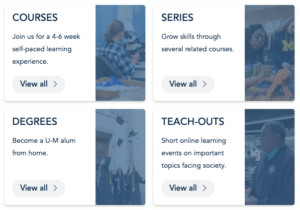We’re still here
Coronavirus continues to wreak havoc on our University, Ann Arbor, the country, and the world.
This page is in no way comprehensive, but it offers a number of campus-wide links to news and feature stories, helpful tips, free courses, brilliant experts, and more, since we last published. We suggest you visit Michigan Medicine and the School of Public Health for even more information.
Philanthropy
U-M’s Chinese community is masterful at thinking globally and acting locally.
Hundreds of boxes of vital medical equipment, crucial in the fight against COVID-19, arrived in Ann Arbor recently thanks to the generosity of the University’s faculty and alumni from China.
Organized by the U-M Association of Chinese Professors (UM-ACP), the fundraiser has collected monetary gifts and donations of personal protective equipment, commonly known as PPE, to be donated to the U-M Health System and other health care facilities around Ann Arbor.
“As members of the U-M community, we would like to contribute more besides the online teaching, mentoring, education, and research work that we are able to continue thanks to our frontline heroes at Michigan Medicine,” says Duxin Sun, J.G. Searle Professor of Pharmaceutical Sciences at the College of Pharmacy and a member of UM-ACP (pictured above, far right).
UM-ACP, with funds raised among more than 300 members, donated more than 12,000 masks and respirators, 4,000 coveralls, and 3,000 face shields and goggles, and a $10,000 cash gift to the U-M COVID-19 Fund. In addition, ACP also facilitated donations of over 120,000 masks and respirators from alumni, parents, and friends in China. (Keep reading.)
COVID-19 guide for nonprofits
As the nation faces this public health crisis and prepares for the related economic downturn, many nonprofit organizations are on the frontlines responding to community basic needs such as food and shelter. Like small businesses, they also face this crisis with a challenging financial outlook.The federal government recently authorized the Federal Emergency Management Agency (FEMA) to provide funding under its public assistance program to help nonprofit organizations recoup some of the increased costs they’re incurring as a result of emergency response efforts.
The “Michigan Resource Guide for Nonprofits Seeking COVID-19 FEMA Public Assistance” offers timely information for Michigan nonprofits. The University of Michigan’s Youth Policy Lab created the guide. (Keep reading.)
U-M official announcements
University of Michigan health professionals have been closely monitoring the spread of COVID-19 over the past two months. The changes U-M has implemented follow the general public health principle of limiting the interaction of people within larger groups to diminish disease transmission and protect everyone in our communities, particularly the most vulnerable. (Keep reading.)
Important COVID-19 updates:
- U-M is instituting several measures to preserve financial resources, including hiring and salary freezes; offering voluntary programs for furloughs and reduced hours; postponing construction projects; and suspending all non-essential expenditures. (4/20/20)
- All U-M events, and events organized by others on our campuses, are canceled until at least May 15 pursuant with the latest executive order from Governor Gretchen Whitmer. (4/24/20)
- The Office of the Provost has offered guidance on student engaged learning experiences for spring/summer and summer terms.
- U-M is suspending all international and domestic air travel until June 30.
- All U-M education abroad programs are suspended for spring and summer terms.
- U-M libraries, museums and workout facilities are closed until further notice.
Research
Researchers go all in to fight coronavirus
Even though the University paused most of its massive laboratory and clinical research operations in March to prevent the spread of coronavirus, hundreds of people from many of U-M’s 19 schools and colleges have connected virtually to start new projects, or adapt their existing work, to address many aspects of the global health crisis.
Dozens of these projects are listed on the new U-M COVID-19 Research Index, at myumi.ch/umor-covid, and more are always being added. The projects listed are in various stages of development, from planning to fully launched, and some will require additional regulatory review or funding before proceeding. (Keep reading.)
More podcasts from Public Health
How to talk to kids about coronavirus
While many families are feeling additional stressors due to the spread of coronavirus, there are unique challenges to what kids are facing. How do we talk to kids about what is happening? Alison Miller from the University of Michigan School of Public Health explains how stress may manifest in children and some of the activities families can do to lessen the impact.
More “Population Healthy” podcasts from the School of Public Health
Free courses, activities, exhibits offered by U-M
Visit this wide-ranging resource from Michigan News, which features online learning opportunities you can enjoy right now.
In addition, U-M’s art and performance organizations and its libraries have many exhibits, performances, speakers, and other enriching resources online. Museums, galleries, and units across campus are currently working to create online content to assist K-12 and college learners. Stay up to date at arts.umich.edu
Through Michigan Online, U-M has several online learning opportunities for those who want to try something new, sharpen an existing skill, or just be enriched. U-M has a portfolio of more than 180 online learning opportunities.
Use Coursera.org/umich to start streaming on-demand video lectures today from top instructors in subjects like business, computer science, data science, language learning, and more.
Faculty experts
Life after COVID-19
As public debate and discourse continue on how fast society should reopen in the wake of COVID-19, it’s also worth asking some other questions: What should life be like after the pandemic passes? What are ways that we can as a culture resume a more normal life, and, perhaps, come out ahead with lessons learned from this crisis? Experts weigh in with insightful responses that are part prescription and prediction, as well as a healthy mix of reality and aspiration. (Keep reading.)
Coping with fear
The COVID-19 pandemic has evoked many emotions among people worldwide — none more prevalent than fear. These fears, according to psychology professor Joshua Ackerman, can be managed by finding activities that improve well-being and decision-making. (Keep reading.)
Convincing loved ones to stay home
Geoffrey Hoffman, assistant professor of nursing, studies older adult care and health policies that affect older adults. The mortality rate for COVID-19 increases for older adults, yet we’ve seen anecdotal evidence and media reports of older adults not self-isolating and millennials flouting warnings against gathering in groups. In this Q&A, Hoffman discusses stigma and isolation among older adults, and how to talk to your older parents and friends about staying safe amid coronavirus. (Keep reading.)
Prisons, domestic violence, and COVID-19
The first case of COVID-19 in a Michigan prison was reported March 27 at the Women’s Huron Valley Correctional Facility in Ypsilanti. Since then, the Michigan Department of Corrections has confirmed more than 400 cases in several prisons across the state, with the virus accounting for 10 deaths. Carol Jacobsen, a professor at the Stamps School of Art & Design, is an award-winning social documentary artist whose works in video and photography address issues of women’s criminalization and censorship. (Keep reading.)
Health and Wellness
COVID-19
Find the latest health tips, updates, and research from Michigan Health and the Michigan Health Lab on the coronavirus outbreak.
14 things to do if you live with someone who has COVID-19
First: Call their regular doctor’s office, if they have one, or your county health department to report the symptoms and ask if they can get tested. If they can, you should help them get to a testing location. But make sure they, and you, wear a mask or cloth over both mouth and nose when you’re taking them. Keep the window of the car cracked open a bit to let air circulate. (Keep reading.)
Is your home workspace causing neck pain?
With many Americans working from home unexpectedly during the COVID-19 pandemic, people are turning their dining room tables, couches, or even quiet closets, into a workspace. And for some, several weeks of working from home have already come and gone. But, what is working in an environment unlike the typical office and desk setting doing to the back, spine and neck? (Keep reading.)
Understanding how coronavirus operates
Experts from the University of Michigan School of Public Health compiled this presentation to broaden the understanding of the coronavirus pandemic. It is not intended to provide ongoing updates of this dynamic situation, but to serve as foundational knowledge from Michigan Public Health’s faculty experts on a broad range of topics related to coronavirus. For more information on coronavirus, visit publichealth.umich.edu.




